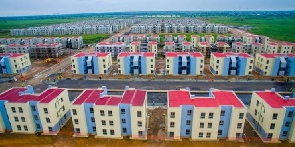Accra, July 1, GNA - Mr. Tsatsu Tsikata, former Chief Executive of Ghana National Petroleum Corporation (GNPC) and a legal luminary challenges the Supreme Court and the Attorney General for breaching the constitution in throwing out an application he had filed with the highest court of the land.
He has therefore, filed an appeal at the same Supreme Court to quash its judgement against him saying that the Supreme Court was not duly constituted to take a decision in a case he had brought to it from the Appeals Court.
Mr Tsikata is claiming that:"The judgement delivered by the Supreme Court and the orders made when the court was not duly constituted are therefore, null and void and of no effect."
The current suit was filed on June 30, this year, at the Supreme Court after the same court had dismissed his application that had sought to ask the Appeal Court to make null and void its decision to commit him to open his defence.
The writ said Tsikata brought before the Supreme Court an appeal from a decision of the Court of Appeal delivered on 27th November 2003, whereby the court of appeal upheld a ruling of the High Court rejecting a submission of no case made by counsel for and on behalf of plaintiff in the criminal proceedings against him.
Tsikata is standing trial for circumventing laid down corporate objectives of GNPC, when he by-passed the Board and on his own committed the GNPC to guarantee a loan of 5.5 million French Francs that Caisse Fran=E7aise de Developpement, a French Aid Agency, granted to Valley Farm, a private cocoa growing company.
The GNPC held initial equity shares of 17.39 per cent in the Company.
Tsikata in current writ said, The first defendant, the Chief Justice, is the Head of the Judiciary and responsible for empanelling Justices of the Supreme Court to hear and determine matters in the Supreme Court and for the administration of the Judiciary generally. He said the second defendant, the Attorney General, initiated the said criminal proceedings against him, which led to proceedings before the Supreme Court.
Tsikata, in his writ said five Justices of the Supreme Court- Ataguba, Akuffo, Wood, Brobbey and Ocran were empanelled to hear and determine the appeal brought by Plaintiff before the Supreme Court. But on July 7, 2004 at a sitting of the Supreme Court the parties were directed to file written arguments in support of their case and the court adjourned to July 28 2004.
On July 28 the Supreme Court adjourned the case to October 27 2004 for judgement.
Tsikata, in his claim, said Justice Brobbey, who had been appointed Chief Justice of the Gambia, left the jurisdiction shortly after that sitting to assume duty and has remained at all material times in the Gambia in that position.
He said with the departure of Justice Brobbey to assume duty as Chief Justice of the Gambia, it was incumbent on the Chief Justice, by virtue of Article 125(4) of the 1992 Constitution, to ensure a panel of five justices of the Supreme Court for the hearing and determination of the appeal.
The Claim said the Chief Justice failed to ensure such panel for the determination of the Appeal on November 8, 2004.
On October 27, 2004 the case was listed and plaintiff (Mr Tsikata) and his counsel went to court, where they were called into chambers and informed that the court had not "heard from" Justice Brobbey and therefore, the case was adjourned to November 8 2005.
But on November 8, 2004, the statement said, four justices of the Supreme Court of the panel- Justices Ataguba, Akuffo, Wood and Ocran- sat and purported to deliver judgement in the case.
"The purported order of the court dismissing the appeal was signed by only the four justices", the statement said.
The Statement held that Article 128(2) of the 1992 Constitution provides that: "The Supreme Court shall be duly constituted for its work by not less than five Supreme Court Justices except as otherwise provided in article 133 of this Constitution."
It said the reading by Justice Wood of a purported statement of concurrence with the majority decision read by Justice Ocran could not cure the defect of the Supreme Court not being duly constituted since the Court had to be properly constituted by not less than five Supreme Court Justices to undertake its work that day.
The Statement said Justice Brobbey, after his departure from the jurisdiction to assume office as Chief Justice of Gambia was disabled from participating in the further hearing of the case after the sitting of the Court on July 28 2004.
"Justice Brobbey therefore, did not, in fact, after the said sitting, take part in the deliberations of the court on the matter as he ceased to be a member of the panel."
Mr Tsikata contends that Justice Brobbey could not, while in office as Chief Justice of the Gambia, participate concurrently as a panel member in the Supreme Court of Ghana.
As such, Justice Brobbey could not lawfully provide a statement, whether of concurrence or of dissent, in respect of the determination of the appeal.
"The Supreme Court was therefore, not duly constituted for its work in respect of the determination of the appeal brought by the Plaintiff", the statement said.
Mr Tsikata's Statement seeks a declaration that the purported judgement of the Supreme Court constituted by less than five Justices on 8th November 2004 in Criminal Appeal No. J3/4/2004 was null and void. It also seeks an injunction restraining the Defendants, their servants, agents and assigns from taking any steps based on the purported judgement of 8th November 2004. 1 July 05
General News of Friday, 1 July 2005
Source: GNA
















